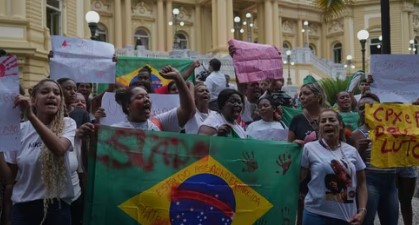
President Lula said he has instructed the minister of justice and the director-general of the federal police to go to Rio for a meeting with the governor.
Protests erupted in Brazil on Wednesday after at least 121 people were killed in a deadly police operation on drug gangs in Rio de Janeiro a day before. The raids turned into shootouts between cops and members of organised crime groups, Bloomberg reported citing Rio state officials. Among those who were killed in the carnage were also four police officers.
The raids reportedly targeted a gang called Comando Vermelho, or Red Command, in Rio de Janeiro, according to authorities. The gang reportedly controls the drug trade in several favelas in the city.
The brutality of one of the deadliest single-day police operations in the nation’s history also drew condemnation from the United Nations.
What is going on in Brazil?
- On Tuesday, police in Rio de Janeiro launched a deadly operation against the Red Command gang through helicopters, armored vehicles and on foot. The operation drew cross firing and led to chaos, leading to closure of schools, cancellation of classes in universities and road closures.
- The operation was launched by the state forces without federal support and was described by Rio de Janeiro’s governor, a conservative, as the beginning of a “war”.
- Rio police have confirmed that so far, 121 deaths have been confirmed which also includes four cops, reported news agency Reuters. According to public defenders, the toll could go up to at least 132.
- "The elevated lethality of the operation was expected but not desired," said Victor Santos, head of security for Rio state adding any reported police "misconduct” will be probed.
- The operation also drew criticism from the country’s own leaders with Brazil’s justice minister Ricardo Lewandowski criticising the use of “brute strength” by the police to target drug gangs across Rio de Janeiro. He also added that Brazil’s President Luiz Inacio Lula da Silva was ‘appalled’ by the violence.
- While talking to reporters, Lewandowski said that the federal government was not informed about the operation beforehand. “The first impression is that the operation was extremely bloody, extremely violent…Physical force alone isn’t enough. Confrontation must be carried out with intelligence, planning and coordination among the various forces,” he said, reported Bloomberg.
- President Lula said that he met his ministers and instructed the minister of justice and the director-general of the federal police to go to Rio for a meeting with the governor. “We cannot accept that organized crime continues to destroy families, oppress residents, and spread drugs and violence across cities. We need coordinated work that strikes at the backbone of drug trafficking without putting police, children, and innocent families at risk,” he wrote on X.
- People in Rio de Janeiro lined up bloodied corpses onto the streets which they found overnight as they mourned their deaths. “I just want to take my son out of here and bury him," Reuters quoted a grieving mother of one of those killed as saying.
- Criticising the operation and the amount of casualties it led to, the United Nations human rights office said in a statement, “We remind authorities of their obligations under international human rights law, and urge prompt and effective investigations”
- Describing the operation as a massacre, local activist Raull Santiago said, “We saw executed people: shot in the back, shots to the head, stab wounds, people tied up. This level of brutality, the hatred that is spread - there’s no other way to describe it except as a massacre,” reported AP.

















